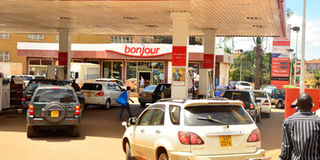Fuel tax to increase pump prices

Cars queue at a petrol station in Kampala. The excise duty on fuel in the next financial year 2015/16 by Shs50 is expected to raise Shs62 billion. FILE POTO
What you need to know:
Tax. The duty on petrol will grow to Shs1,000 and Diesel to Shs680 after Shs50 increment in excise duty by the finance minister.
Kampala. Finance minister Matia Kasaija’s Shs23.9 trillion National Budget was the highest leap for any Budget and perhaps the most confusing for MPs, donors, the International Monetary Fund, World Bank and economists.
The actual Budget, according to the Ministry of Finance, is Shs18.3 trillion, up from Shs15 trillion in 2014/15. Ugandans will fund the bulk of this budget be it from contributing tax revenue and paying interest on debt being accumulated by government to finance infrastructure projects.
In the speech, Mr Kasaija noted that the “main thrust of tax policy is to progressively enhance revenue mobilisation to fully finance the Budget.” Adding, the government aim is to ensure “that taxation is not a hindrance to private sector investment, savings, production and social welfare.” Among the proposals is to raise Shs62bilion from petroleum products.
After a consistent drop in fuel prices in the last one year from Shs3,850 and Shs3,250 to Shs3,400 and Shs2,850 for Petrol and Diesel respectively, prices are set to rise again.
For the third year in a row, government has increased the excise duty on both diesel and petroleum. The duty on petrol will grow to Shs1,000 and Diesel to Shs680 after Shs50 increment in excise duty by the Finance minister.
Mr Kasaija described the adjustments as modest but fuel dealers are already sending warning shots.
“The price of fuel is expected to rise, due to the increase in excise duty,” says Mr Hans Paulsen the managing director, Vivo Energy Uganda, the Shell Licensee.
He further predicts that transport fares and food will increase as a result of high fuel prices.
“Transport and food all depend on fuel, the higher the cost of fuel, the higher the cost of Transport and food,” he adds.
Mr Allan Omuron, the Total Uganda retail sales manager, said it is not a clear straight line that whenever there is an increase in taxes, they increase their prices. It is a function of many elements that determine a price.
“The increase in taxes is an externality; for us we have to pass it on, but we weigh. We don’t pass it on 100 per cent. We share the burden with the customer,” he says.
On July 1, fuel companies will integrate the Shs50 in the fuel price, which will reflect an increment in pump prices.
Effects
Mr Ashok Goyal, head finance and accounts, Gapco Uganda at the Uganda Chamber of Commerce post-Budget briefing also noted that fuel prices have a trickle-down effect in terms of pricing for transport.
“Definitely, the increase in excise duty is going to push up the price of fuel. Fuel is the basic need of the country that has the potential of pushing the cost of transportation of food and people,” he says.
Notably, since the drop in fuel prices, transport fares for passenger service vehicles and commercial vehicles have largely remained stagnant. The drop in fuel prices over the last one year, has been largely attributed to the fall in global oil prices.
However, this has been undone by the depreciation of the Uganda Shilling by 20 per cent in the last one year.




